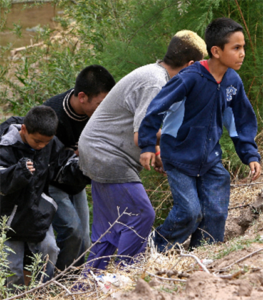Legal challenge to US’ deportation of child migrants
Human rights groups have launched a landmark legal class action against the Trump administration’s controversial policy of expelling migrant children from the US’ southern border without giving them an opportunity to seek humanitarian asylum.
The case, led by the American Civil Liberties Union in the US District Court in Washington, seeks to block border officials from citing an emergency public health order to suspend the legal safeguards the US Congress created for migrant children who are arrested crossing the border without their parents.
 Citing the COVID-19 pandemic, the Trump administration has expelled tens of thousands of unauthorised migrants and asylum-seekers from the US-Mexico border, saying they could spread the virus inside the US.
Citing the COVID-19 pandemic, the Trump administration has expelled tens of thousands of unauthorised migrants and asylum-seekers from the US-Mexico border, saying they could spread the virus inside the US.
At least 2,000 unaccompanied children are among those expelled under the policy, instead of being placed in government-overseen shelters and allowed to seek asylum or other forms of relief from deportation.
US Customs and Border Protection has said its officials have carried out more than 109,000 summary expulsions along the southern border since March but the real number of unaccompanied children expelled is unknown because the agency has refused to disclose recent figures, citing ongoing litigation.
But statistics from the Office of Refugee Resettlement, which the US Congress tasked with caring for these minors, show that relatively few migrant children are being allowed to stay in the US during the pandemic.
Last month, reports say, there were 2,506 arrests of unaccompanied minors. But only 168 migrant children – less than 7 per cent of the total arrests – were transferred to the Office of Refugee Resettlement.
Because of this drop in referrals from border officials, the population of migrant children in the refugee agency’s custody has dropped dramatically, reaching less than 830 recently – down from more than 3,500 in late March.
The most recent legal challenge is the first to ask the district court in Washington, to block the use of the public health order to expel minors and to certify all migrant children as class members in the case.
“We filed this class-action lawsuit because the Trump administration left us no choice, repeatedly refusing to allow its unprecedented shadow immigration policy to be tested in the courts in an individual case,” Lee Gelernt, the lead ACLU attorney in the case, said in a statement.
“The policy is the most extreme asylum ban yet from this administration, ignoring all of the protections Congress has enacted since World War II to protect children and those fleeing danger.”
The case centres on an indigenous 16-year-old boy from Guatemala who border officials are seeking to expel under the public health order, which was first issued in March by the director of the Centers for Disease Control and Prevention.
According to the ACLU, the boy, identified by his initials P.J.E.S., fled his Mayan community after he and his family received death threats because of his father’s political views.
The teenager, who the ACLU said also fled threats from gang members who wanted to recruit him, journeyed north to reunite with his father, who lives in the US.
But when he crossed the Texas border earlier this week, he was processed under the CDC order and is set to be expelled.
Instead of transferring unaccompanied children to the Office of Refugee Resettlement, which connects them with lawyers and child advocates as it seeks to place them with family members in the US, the Trump administration has been placing many of them in hotels along the border without access to lawyers and expelling them to their home countries via deportation flights.
In the challenge, the ACLU, the Texas Civil Rights Project and Oxfam America argued that the centuries-old public health law the administration is citing to expel migrants does not authorize expulsions.
The groups argued that expelling unaccompanied migrant children violates a 2008 anti-trafficking statute that requires their prompt transfer to the refugee agency and protects them from expedited deportations, as well as laws that afford them access to humanitarian protections from deportation, like asylum.












